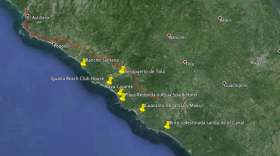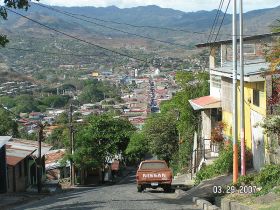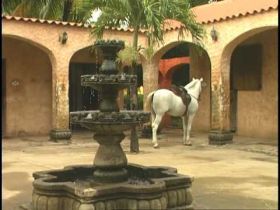What is Nicaragua's economic system? More free market, capitalistic, socialist, etc.?
John-Marc Gallagher - GPS Real Estate
The economic system of Nicaragua is a mixture of capitalistic, socialistic, and free market. The country and it’s politics are promoting, pushing, and touting 21st century socialism but no one, including Hugo Chavez, has been able to coin what 21st century socialism is, but I have my own explanation.
21st century socialism is a socialistic approach that allows the free market, free enterprise, and the capitalist system to occupy the private sector. At the same time, they...
The economic system of Nicaragua is a mixture of capitalistic, socialistic, and free market. The country and it’s politics are promoting, pushing, and touting 21st century socialism but no one, including Hugo Chavez, has been able to coin what 21st century socialism is, but I have my own explanation.
21st century socialism is a socialistic approach that allows the free market, free enterprise, and the capitalist system to occupy the private sector. At the same time, they want the sectors such as medicine, banks, or oil to be socialized. They want to be socialistic but they also understand that the world turns on the free market and free enterprise system. Therefore, the private sector is allowed to operate in a free market but the public sector and the country in general, pushes Christianity, solidarity, and socialism.
Christianity, solidarity, and socialism are the three words they use on all of their political banners, but they are also open to the free market, free enterprise, and capitalistic method of operation. That includes respecting property rights and a functioning judiciary.
Posted September 25, 2014
Daniel Snider - Snider's Realty Nicaragua
 Nicaragua is a capitalistic, free market system that wants to incentive growth through capitalistic models via investments, financing, and being able to create value out of that. With the new incentives that the government offers, businesses are able to build infrastructure and do business.
Nicaragua is a capitalistic, free market system that wants to incentive growth through capitalistic models via investments, financing, and being able to create value out of that. With the new incentives that the government offers, businesses are able to build infrastructure and do business.  Nicaragua is a capitalistic, free market system that wants to incentive growth through capitalistic models via investments, financing, and being able to create value out of that. With the new incentives that the government offers, businesses are able to build infrastructure and do business.
Nicaragua is a capitalistic, free market system that wants to incentive growth through capitalistic models via investments, financing, and being able to create value out of that. With the new incentives that the government offers, businesses are able to build infrastructure and do business. Posted December 12, 2014
Gabriel Sánchez - PRONicaragua
 The Nicaragua economic system is a free market. Most sectors are not regulated. Commerce, tourism and manufacturing industries and businesses are all open sectors for business. There are some sectors that are regulated, but that is not particular to Nicaragua. These are the energy, telecommunications and health sectors. However, these are the sectors that are regulated in most countries because they are the more sensitive sectors for the economy of the country. Outside those...
The Nicaragua economic system is a free market. Most sectors are not regulated. Commerce, tourism and manufacturing industries and businesses are all open sectors for business. There are some sectors that are regulated, but that is not particular to Nicaragua. These are the energy, telecommunications and health sectors. However, these are the sectors that are regulated in most countries because they are the more sensitive sectors for the economy of the country. Outside those... The Nicaragua economic system is a free market. Most sectors are not regulated. Commerce, tourism and manufacturing industries and businesses are all open sectors for business. There are some sectors that are regulated, but that is not particular to Nicaragua. These are the energy, telecommunications and health sectors. However, these are the sectors that are regulated in most countries because they are the more sensitive sectors for the economy of the country. Outside those sectors, it’s a totally free market and economy.
The Nicaragua economic system is a free market. Most sectors are not regulated. Commerce, tourism and manufacturing industries and businesses are all open sectors for business. There are some sectors that are regulated, but that is not particular to Nicaragua. These are the energy, telecommunications and health sectors. However, these are the sectors that are regulated in most countries because they are the more sensitive sectors for the economy of the country. Outside those sectors, it’s a totally free market and economy.Sectors that are not regulated include anything that has to do with the tourism industry such as hotels, restaurants, and bars. In commerce, if you’re going to open up a store, there’s a couple of licenses and permits that are required, but that’s kind of a standard procedure for any type of business in the country. Any type of retail business is totally open. Manufacturing operations are not regulated sectors. Those are the main sectors that have been growing the most recently and make up the largest portion of the economy.
Having a socialist government, like the one in Nicaragua, means the government’s main priority is the welfare of its people. It does not mean, in any sense, that there is any type of restriction to businesses, business procedures and investors. It just means that every action that is taken by the government has as its consideration and top priority the well-being of the Nicaraguan citizens.
There were cases 30 years ago when there was a very difficult internal situation and the government came in and took the properties of individuals, but this has not happened since. Some of the actions had to be taken to ensure the national security and sovereignty of the country. No one is looking for that to happen again. It was a very circumstantial situation which is not today’s reality, so the government does not expropriate companies or properties. This is not happening and it is not the government’s intention or activity. The government knows that doing this is not a conducive action towards economic buildup and investment. The government of Nicaragua has a vision that business and investment is a crucial part of the mix that ensures the country to continue developing in a sustainable and really good rhythm of growth. Like I said, there is a vision that business and investment is a crucial part of the mix to be able to ensure that the country continues developing in a sustainable and really good rhythm of growth.
What we have seen in the last eight or nine years is the understanding of private businesses and the importance of respecting the economic community and fostering the growth of the business economy in Nicaragua.
Posted March 26, 2015
Frank Martínez
 Nicaragua is definitely capitalistic. Nicaragua is open for business. We get investors from all over the world – United States, Latin America, Europe, Eastern Europe, China, Asia. Investors from these parts of the world are in Nicaragua right now. Getting permits to start a business in Nicaragua can be very slow and difficult, but if you hire the right attorney or right counselor or associate yourself with people who know the system, you can get a permit faster in a 100% free...
Nicaragua is definitely capitalistic. Nicaragua is open for business. We get investors from all over the world – United States, Latin America, Europe, Eastern Europe, China, Asia. Investors from these parts of the world are in Nicaragua right now. Getting permits to start a business in Nicaragua can be very slow and difficult, but if you hire the right attorney or right counselor or associate yourself with people who know the system, you can get a permit faster in a 100% free... Nicaragua is definitely capitalistic. Nicaragua is open for business. We get investors from all over the world – United States, Latin America, Europe, Eastern Europe, China, Asia. Investors from these parts of the world are in Nicaragua right now. Getting permits to start a business in Nicaragua can be very slow and difficult, but if you hire the right attorney or right counselor or associate yourself with people who know the system, you can get a permit faster in a 100% free market way.
Nicaragua is definitely capitalistic. Nicaragua is open for business. We get investors from all over the world – United States, Latin America, Europe, Eastern Europe, China, Asia. Investors from these parts of the world are in Nicaragua right now. Getting permits to start a business in Nicaragua can be very slow and difficult, but if you hire the right attorney or right counselor or associate yourself with people who know the system, you can get a permit faster in a 100% free market way. Nicaragua has a Sandinista government and Sandinistas claim that they are socialist, but Nicaragua is open for business nonetheless. Sandinistas only say that they are socialist. In practice, they are not. In the real world, they are very capitalistic. The government is very capitalistic and open for any investment.
Posted April 6, 2015
Mario Robleto - SAENICSA Accounting and Tax Services
 Forty years ago, Nicaragua’s economic system was more towards communism, but then that was overturned. Towards the present, Nicaragua’s governmental system is a mix between democratic and socialist and the economy has in some ways copied that. You can see it in different ways that business is done, what the government requires of businesses here with reference to the businesses’ obligations to their employees. You could still see some socialist types of markets or...
Forty years ago, Nicaragua’s economic system was more towards communism, but then that was overturned. Towards the present, Nicaragua’s governmental system is a mix between democratic and socialist and the economy has in some ways copied that. You can see it in different ways that business is done, what the government requires of businesses here with reference to the businesses’ obligations to their employees. You could still see some socialist types of markets or... Forty years ago, Nicaragua’s economic system was more towards communism, but then that was overturned. Towards the present, Nicaragua’s governmental system is a mix between democratic and socialist and the economy has in some ways copied that. You can see it in different ways that business is done, what the government requires of businesses here with reference to the businesses’ obligations to their employees. You could still see some socialist types of markets or socialist ways of thinking and way of doing things. But then you also see capitalism. For example, some of the bigger Nicaraguan corporations are not only here in Nicaragua but throughout Central America and some have even gone to the US.
Forty years ago, Nicaragua’s economic system was more towards communism, but then that was overturned. Towards the present, Nicaragua’s governmental system is a mix between democratic and socialist and the economy has in some ways copied that. You can see it in different ways that business is done, what the government requires of businesses here with reference to the businesses’ obligations to their employees. You could still see some socialist types of markets or socialist ways of thinking and way of doing things. But then you also see capitalism. For example, some of the bigger Nicaraguan corporations are not only here in Nicaragua but throughout Central America and some have even gone to the US.For example, some of the Nicaraguan banks have actually gone to the US. In fact, the Bancentro LAFISE has started doing business in the US. They have branches now in Florida. I don’t think Banco de America Central has gone to the US yet, but they are throughout the region from Mexico to Panama. So there’s a little bit of both flavors, both socialist and democratic capitalist.
You can very well open a business here in Nicaragua. To invest in Nicaragua, each and every day is more of a sure investment in the way that if you bring your money here and you purchase, invest, or you open a company or a business it’s in sure in the sense that it will be yours. That’s your investment. Nobody is going to take that away from you as in the situation of let’s say a civil uprising, a revolution, an earthquake, or one of those many things that people associate with Nicaragua. Now it’s different. Nicaragua is in a different economic situation. It’s a different social situation and there are a lot of factors that now create a healthy environment for investors.
Of course, just like in any investment, you have to be careful and you still have to do your due diligence. Unfortunately, what I’ve seen here is a lot of people who are considering an investment just asking, “Can I do this?”, “Is this the correct way to do things?”, or, “What do you suggest?”. The problem is that they’re not asking the right people; the lawyers, accountants, or people who have studied and have in depth knowledge of what’s the legal procedure, the correct procedure to purchase a property or open a business, how to pay taxes, how to discharge your responsibilities as an employer, etc. A lot of times people come down here and they prefer to just to ask the neighbor or the person they know questions about the proper procedures for starting a business and hiring employees. And sometimes, that leads to negative consequences because of going by hearsay.
As a new and naïve investor, I might take my money, purchase a property, but in reality because I didn’t do my due diligence or look for the guidance from someone who’s experienced and has knowledge of how these things are done in Nicaragua, I might be taken advantage of. My money may be stolen, or worse.
For example, I’ve even heard of situations of people coming here to buy a house, villa, condo, or an apartment and they were presented with a contract in English, while here in Nicaragua the official language of the country is Spanish. If you were to sign an English contract here it’s not valid. But unfortunately people have been taken advantage of in situations like that. I know one person that was outed $25,000.
So, yes, you can invest, it’s a safe investment, but you have to be careful and have to do your due diligence. You have to cross your I’s and cross your t’s. It’s important to do that and if you find a professional who will guide you, you have to weigh the pros and cons of paying the money or taking your chances, just like in the US. You have to find someone who you can trust. You really have to take time, use discernment, and make a good decision. And if you do that, well, usually you’ll end up making a good return of your investment.
Posted March 9, 2016


